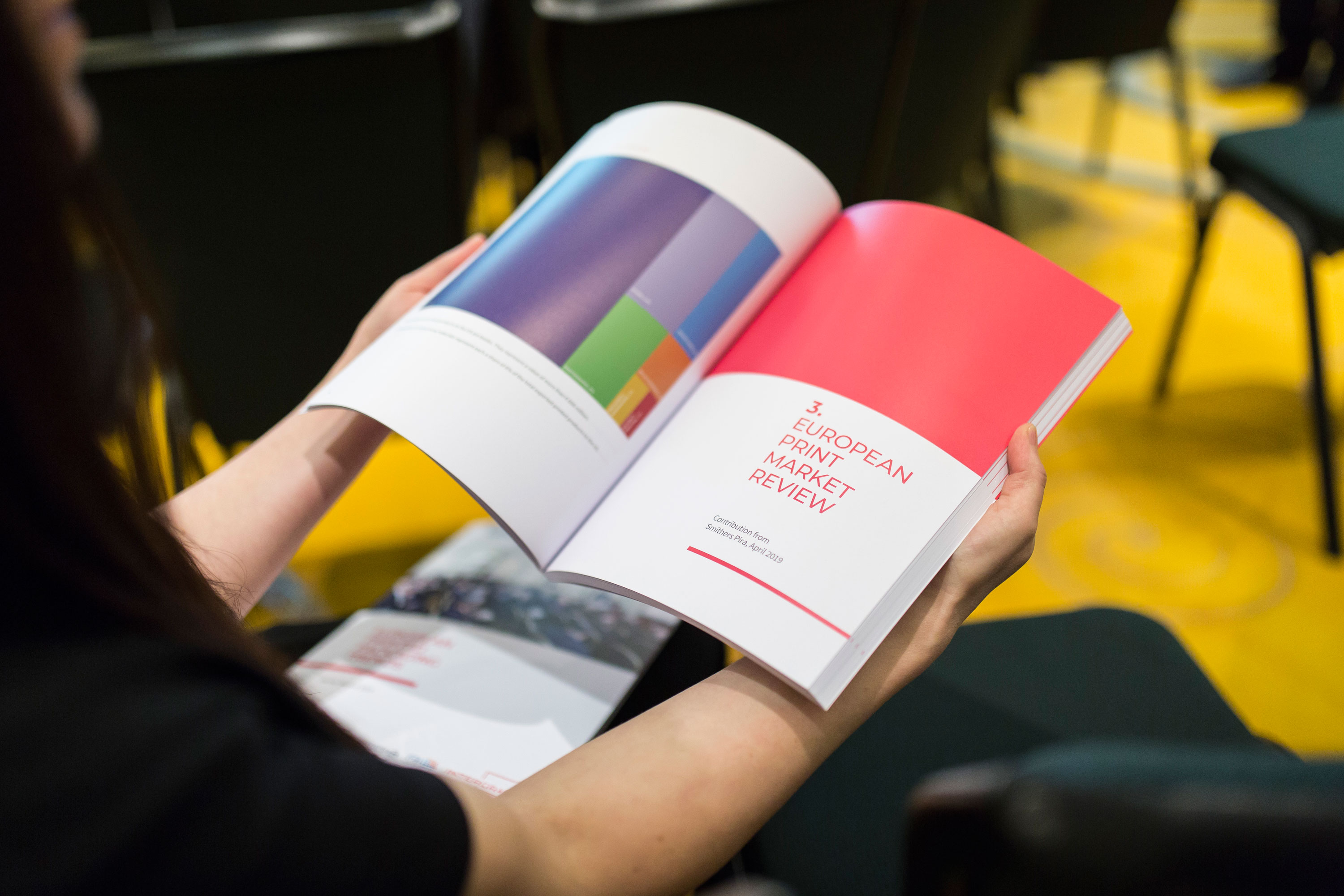European Social Dialogue: The future of reading
1 October 2019

Printed learning materials play a vital role in the future of education in Europe – even for so-called ‘digital natives’. The wide body of independent academic research carried out on this topic clearly demonstrates that urgent action must be taken to ensure students’ reading comprehension and critical thinking skills are not irrevocably damaged by the rapid and unsubstantiated introduction of screen reading in schools.
Intergraf and UNI Europa Graphical & Packaging call on policymakers and education bodies (European and national) to act now without delay. Print reading must be prioritised over digital reading in schools unless there is a proven learning advantage of digital. Inaction risks a degradation of students’ reading comprehension and critical thinking skills, which could hinder the creation of educated, critical thinking citizens in our society for decades.
Background
Innovative digital technologies continue to bring many benefits to society and industry alike. However, it is clear that there still remains an important place for traditional media in our digital world – particularly when it comes to education. Classrooms across Europe rely more-and-more on digital tools to aid teaching. This can bring students many benefits. However, when it comes to reading, it has now been overwhelmingly proven that the sensory and haptic experience of reading on paper – rather than on a screen – has the best learning outcomes. The future of reading is print and paper.
The true educational advantages of reading on paper are generally not well known outside of academic circles. This is due in part to a widespread and largely unquestioned belief that digital always equals positive progress, and in part due to a lack of communication and/or acknowledgement of the results of research proving otherwise. The breadth of independent academic research on this topic is growing. This research supplements – and validates – the multitude of studies carried out to date by industry actors.
COST Action E-READ (Evolution of Reading in the Age of Digitalisation)
The most notable and comprehensive independent academic research conducted about the impact of digitalisation on reading practices – particularly in children and young adults – was recently completed under the COST Action E-READ initiative. Members and stakeholders of E-READ carried out four years of empirical research and debates about reading comprehension between 2014 and 2018, including a wide-ranging meta-analysis of 54 individual experiments that involved more than 170,000 participants from 19 countries.
E-READ established that print readers have a better recall of temporal relations between events and are able to more correctly reconstruct the plot of a text than screen readers. It was also found that the advantage for print was larger under time constraints and that scrolling resulted in a significant digital disadvantage. In addition, readers were more likely to be overconfident about their comprehension when reading on a screen, particularly when under time pressure. These effects were stronger for more complex texts. With regard to education, the digital disadvantage during elementary school was found to be two-thirds of the yearly increase in reading comprehension, meaning that students potentially only progressed one-third as much as they would have done had they been reading on paper instead of on a screen.
Conclusions of E-READ state that “paper remains the preferred reading medium for longer single texts, especially when reading for deeper comprehension and retention, and that paper best supports long-form reading of informational texts.” The research also clarifies that “Reading long-form texts is invaluable for a number of cognitive achievements, such as concentration, vocabulary building and memory.” These findings were the same across all age groups, education levels and digital experience levels – with the advantage of paper actually increasing for younger people. This debunks the widely-believed myth of ‘digital natives’. Young people who have grown up in the age of digitalisation still read better on paper.
Significance of this research
A failure to urgently act on the advice given in this multitude of studies creates an obvious, long-term risk that students’ learning outcomes will be negatively affected by the increasing tendency of schools in Europe to promote reading on digital devices, instead of in print, without the necessary tools and strategies to ensure this does not cause a setback in reading comprehension and critical thinking skills.
Policymakers, schools, educators and parents across Europe must be made aware that reading on a screen without the necessary supporting tools hinders children and young people’s learning potential. Digital tools absolutely have their place in the learning environment, but not in every situation. Digital tools are not always best for education. Screen reading should not be introduced in schools if it will be detrimental to children and young people’s reading comprehension and critical thinking skills, which a growing body of independent academic research shows that it is. Products which are proven to facilitate comprehension and critical thinking, such as paper books and other printed informational texts, already exist and should not be overlooked just because they fall into the category of traditional media. Paper is a technology of proven strengths.
Recommendations from the European social partners of the graphic industry
Urgent action must be taken at all levels to ensure that education in Europe is not degraded by the rapid and unsubstantiated introduction of screen reading in schools. The development of students’ reading comprehension and critical thinking skills must be immediately safeguarded.
Intergraf and UNI Europa Graphical & Packaging call on the European Commission to:
- Take into account in the European Digital Agenda and all related digital policy initiatives that not all digital progress brings benefits – especially when it comes to education and reading;
- Promote the use of printed materials in schools and other education environments unless there is a proven learning advantage of digital;
- Support more independent academic research on the effect of digitalisation on reading comprehension and critical thinking skills;
- Develop more and better guidelines for the implementation of digital technologies at European level (especially in education, but also in media environments more generally);
- Support national implementation of the recommendations of the European social partners of the graphic industry and the COST Action E-READ initiative;
- Foster more interaction between academics publishing research about reading comprehension and policymakers / schools / education bodies.
Intergraf and UNI Europa Graphical & Packaging call on Member States to:
- Promote the use of printed materials in schools and other education environments unless there is a proven learning advantage of digital;
- Take into account in policymaking the proven pros and cons of introducing digital reading materials in schools;
- Promote the conclusions of the COST Action E-READ initiative, and other such research, to schools, educators and parents;
- Implement the recommendations of the European social partners of the graphic industry and the COST Action E-READ initiative;
- Motivate schools to use and students to read paper books;
- Set time apart in the school curriculum for print reading;
- Develop more and better guidelines for the implementation of digital technologies at national level (especially in education, but also in media environments more generally);
- Foster more interaction between academics publishing research about reading comprehension and policymakers / schools / education bodies.
Intergraf and UNI Europa Graphical & Packaging call on national social partners to:
- Promote to national policymakers, schools and education bodies the use of printed materials in schools and other education environments since it has a proven learning advantage over digital;
- Inform national education ministries and other relevant policymakers about these important findings.
For their part, the European social partners of the graphic industry will:
- Promote to European policymakers the use of printed materials in schools and other education environments since it has a proven learning advantage over digital;
- Continue to monitor emerging academic research about the effects of digitalisation on reading comprehension and critical thinking skills;
- Identify and promote good practices in the area of education and reading.
Sources:
The Evolution of Reading in the Age of Digitisation (E-READ) Initiative, funded by The European Cooperation in Science and Technology (COST), 2014-18: http://ereadcost.eu/. 54 individual experiments were conducted under this initiative, as well as a meta-analysis of hundreds more existing studies on reading and an even wider bibliography. See also: Stavanger Declaration.
Johanna Dunaway, Kathleen Searles, Mingxiao Sui, Newly Paul, News Attention in a Mobile Era, Journal of Computer-Mediated Communication, Volume 23, Issue 2, March 2018, Pages 107–124, https://doi.org/10.1093/jcmc/zmy004
Baron, N. S. (2015). Words onscreen: The fate of reading in a digital world. New York, NY, US: Oxford University Press, https://psycnet.apa.org/record/2015-05844-000
Lauren M. Singer, Patricia A. Alexander, Reading on Paper and Digitally: What the Past Decades of Empirical Research Reveal, Review of Educational Research, Sage Journals, Volume: 87 issue: 6, December 2017, page(s): 1007-1041: https://doi.org/10.3102/0034654317722961
Myrberg, Caroline, and Ninna Wiberg. 2015. “Screen Vs. Paper: What Is the Difference for Reading and Learning?”. Insights 28 (2): 49–54. DOI: http://doi.org/10.1629/uksg.236
Download the position paper here
{K2Splitter}






